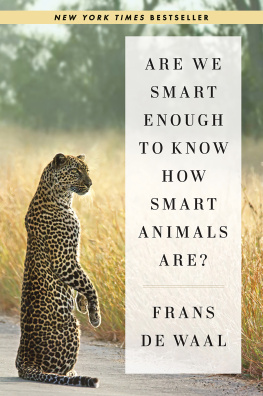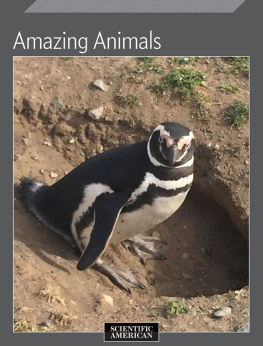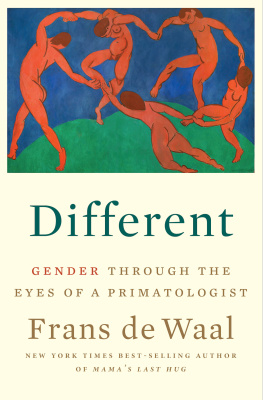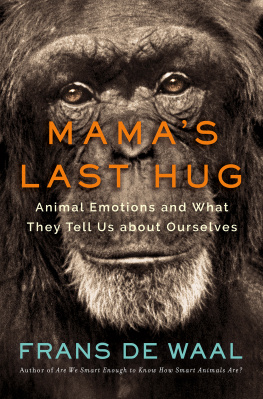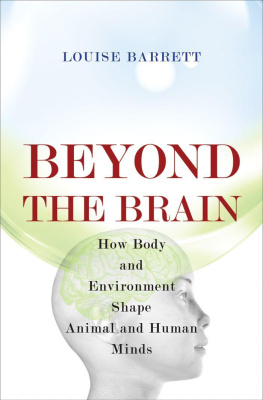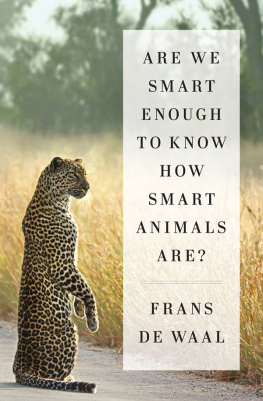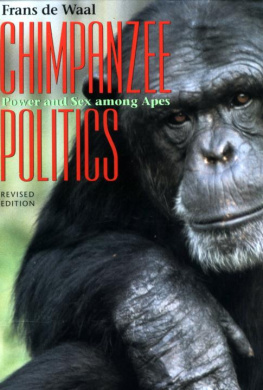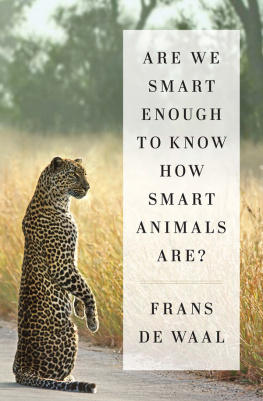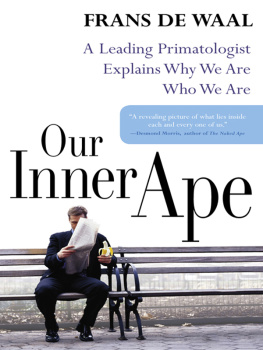

For Catherine,
whom I was smart enough to marry
CONTENTS

The difference in mind between man and the higher animals, great as it is, certainly is one of degree and not of kind.
Charles Darwin (1871)
O ne early November morning, while the days were getting colder, I noticed that Franje, a female chimpanzee, was gathering all the straw from her bedroom. She took it under her arm out onto the large island at the Burgers Zoo, in the Dutch city of Arnhem. Her behavior took me by surprise. First of all, Franje had never done this before, nor had we ever seen other chimps drag straw outside. Second, if her goal was to stay warm during the day, as we suspected, it was notable that she collected the straw while at a cozy temperature inside a heated building. Instead of reacting to the cold, she was bracing for a temperature she could not actually feel. The most reasonable explanation would be that she extrapolated from the previous shivering day to the weather expected today. In any case, later on she stayed nice and warm with little Fons, her son, in the straw nest shed built.
I never cease wondering about the mental level at which animals operate, even as I know full well that a single story is not enough to draw conclusions. But those stories inspire observations and experiments that do help us sort out whats going on. The science fiction novelist Isaac Asimov reportedly once said, The most exciting phrase to hear in science, the one that heralds new discoveries, is not Eureka! but Thats funny. I know this thought all too well. We go through a long process of watching our animals, being intrigued and surprised by their actions, systematically testing our ideas about them, and arguing with colleagues over what the data actually mean. As a result, we are rather slow to accept conclusions, and disagreement lurks around every corner. Even if the initial observation is simple (an ape collects a pile of straw), the repercussions can be enormous. The question as to whether animals make plans for the future, as Franje seemed to be doing, is one that science is currently quite preoccupied with. Specialists speak of mental time travel , chronesthesia , and autonoesis , but I will avoid such arcane terminology and try to translate the progress into ordinary language. I will relate stories of the everyday use of animal intelligence as well as offer actual evidence from controlled experiments. The first tells us what purpose cognitive capacities serve, while the second helps us rule out alternative explanations. I value both equally, even though I realize that stories make easier reading than experiments.
Consider the related question as to whether animals say goodbye as well as hello. The latter is not hard to fathom. Greeting is a response to the appearance of a familiar individual after an absence, such as your dog jumping up at you as soon as you walk through the door. Internet videos of soldiers being saluted by pets upon return from abroad suggest a connection between the length of separation and the intensity of the greeting. We can relate to this connection since it applies to us as well. No grand cognitive theories are necessary to account for it. But what about saying goodbye?
We dread to say farewell to someone we love. My mother cried when I moved across the Atlantic, even though we both realized that my absence would not last forever. Saying goodbye presupposes the realization of future separation, which is why it is rare in animals. But here, too, I have a story. I once trained a female chimpanzee named Kuif to bottle-feed an adopted infant of her species. Kuif acted in every way as the infants mother but lacked sufficient milk of her own to nurse her. We would hand her a bottle of warm milk, which she would carefully give to the baby ape. Kuif got so good at this that shed even briefly withdraw the bottle if the baby needed to burp. This project required that Kuif and the baby, which she kept on her body day and night, be called inside for a feeding during the daytime while the rest of the colony remained outside. After a while we noticed that instead of coming in right away, Kuif would make a long detour. Shed do the rounds on the island, visiting the alpha male, the alpha female, and several good friends, giving each one a kiss, before shed walk toward the building. If the others were asleep, shed wake them up for her goodbyes. Again, the behavior itself was simple, yet the precise circumstances made us wonder about the underlying cognition. Like Franje, Kuif seemed to be thinking ahead.
But what about skeptics who believe that animals are by definition trapped in the present, and only humans contemplate the future? Are they making a reasonable assumption, or are they blinkered as to what animals are capable of? And why is humanity so prone to downplay animal intelligence? We routinely deny them capacities that we take for granted in ourselves. What is behind this? In trying to find out at what mental level other species operate, the real challenge comes not just from the animals themselves but also from within us. Human attitudes, creativity, and imagination are very much part of the story. Before we ask if animals possess a certain kind of intelligence, especially one that we cherish in ourselves, we need to overcome internal resistance to even consider the possibility. Hence this books central question: Are we smart enough to know how smart animals are?
The short answer is Yes, but youd never have guessed. For most of the last century, science was overly cautious and skeptical about the intelligence of animals. Attributing intentions and emotions to animals was seen as nave folk nonsense. We, the scientists, knew better! We never went in for any of this my dog is jealous stuff, or my cat knows what she wants, let alone anything more complicated, such as that animals might reflect on the past or feel one anothers pain. Students of animal behavior either didnt care about cognition or actively opposed the whole notion. Most didnt want to touch the topic with a ten-foot pole. Fortunately, there were exceptionsand I will make sure to dwell on those, since I love the history of my fieldbut the two dominant schools of thought viewed animals as either stimulus-response machines out to obtain rewards and avoid punishment or as robots genetically endowed with useful instincts. While each school fought the other and deemed it too narrow, they shared a fundamentally mechanistic outlook: there was no need to worry about the internal lives of animals, and anyone who did was anthropomorphic, romantic, or unscientific.
Did we have to go through this bleak period? In earlier days, the thinking was noticeably more liberal. Charles Darwin wrote extensively about human and animal emotions, and many a scientist in the nineteenth century was eager to find higher intelligence in animals. It remains a mystery why these efforts were temporarily suspended, and why we voluntarily hung a millstone around the neck of biologywhich is how the great evolutionist Ernst Mayr characterized the Cartesian view of animals as dumb automatons. But times are changing. Everyone must have noticed the avalanche of knowledge emerging over the last few decades, diffused rapidly over the Internet. Almost every week there is a new finding regarding sophisticated animal cognition, often with compelling videos to back it up. We hear that rats may regret their own decisions, that crows manufacture tools, that octopuses recognize human faces, and that special neurons allow monkeys to learn from each others mistakes. We speak openly about culture in animals and about their empathy and friendships. Nothing is off limits anymore, not even the rationality that was once considered humanitys trademark.
Next page
